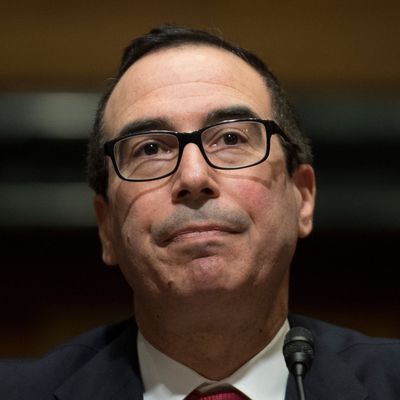
On Thursday, the Senate Finance Committee held a confirmation hearing for our populist president-elect’s pick for Treasury Secretary: A multimillionaire whose résumé includes a diploma from Yale, several years at Goldman Sachs, a stint running a bank that specialized in foreclosures, and experience running a Cayman Islands–based hedge fund that was named after the sand dunes outside his house in the Hamptons.
Steven Mnuchin neglected to mention that last enterprise in the financial-disclosure form he submitted shortly after his nomination last year. And, as one might lose track of spare change left in an old coat pocket, Mnuchin also forgot all about the $95 million in real-estate assets that he’d left lying across the North American continent.
So, the Democratic members of the Finance Committee had a lot of material to work with on Thursday. And Oregon senator Ron Wyden had his indignation level set to 11 from the very start.
After decrying the “truly disgusting inequity and abuse of America’s tax laws,” Wyden declared. “There’s no clearer example than Mr. Mnuchin’s hedge fund setting up outposts in Anguilla and the Cayman Islands, an action that can be explained only by the islands’ zero percent tax rate … Millions of dollars in profits from Hollywood exports like the movie Avatar were funneled to an offshore web of entities and investors.”
Wyden went on to savage Mnuchin’s use of a “dynasty trust” to “shield tens of millions of dollars from taxes,” as well as his funding of a tax-exempt foundation that pushed for the the approval of a bank merger he stood to profit from.
Mnuchin argued that his decision to incorporate Dune Capital in the Cayman Islands was merely “an accommodation to pension funds and nonprofit institutions and a small number of foreign investors” who would benefit from that arrangement. He then promised that, as Treasury Secretary, he would scrutinize the rules that incentivized him to base his business in a foreign tax shelter.
Once Wyden’s jeremiad was through, Republican senator Pat Roberts turned to him and said, “I’ve got a Valium pill here that you might want to take before the second round.” Ohio Democrat Sherrod Brown was apoplectic that Roberts would say such a thing to a distinguished committee member. Roberts then suggested that no man was too distinguished to need a Valium once in a while, saying that he had once offered the benzodiazepine to the president of the United States.
Later, Mnuchin defended himself against the charge that the bank he helped found had deployed abusive and/or illegal tactics to foreclose on embattled homeowners.
“It has been said that I ran a ‘foreclosure machine,’” Mnuchin said. “This is not true. On the contrary, I was committed to loan modifications intended to stop foreclosures. I ran a ‘loan-modification machine.’”
It’s true that Mnuchin was not responsible for the suffering of many of the people his bank foreclosed on. By the time he and his partners purchased the California mortgage giant IndyMac, it had already distributed countless so-called liar loans to borrowers who would never be able to repay them. When Mnuchin renamed the institution OneWest, 178,000 foreclosures were already in the pipeline.
“We invested $1.6 billion into a failing institution when most investors were running for the hills,” Mnuchin told the Senate Finance Committee, arguing that without his intervention, “the outcome for consumers could have been much bleaker.”
And at the behest of the FDIC, OneWest lowered monthly mortgage payments for nearly 102,000 homeowners by 2013, according to Politico.
But an investigation by the California Attorney General’s office alleged that OneWest also committed “widespread” acts of misconduct in its handling of foreclosures, including illegally backdating documents to expedite the foreclosure process and, essentially, gaming foreclosure auctions.
These practices produced plenty of stories no political figure would want to be associated with: In one instance, the bank locked a homeowner out of her house in the midst of a Minnesota blizzard; in another, it foreclosed on a 90-year-old woman whose payment came in 27 cents short.
At a congressional hearing organized by Elizabeth Warren Wednesday, four women told similarly harrowing tales of their experiences with OneWest. (Democrats had hoped to feature the homeowners as witnesses at Mnuchin’s confirmation hearing, but Finance Committee chair Orrin Hatch felt that would be bad idea).
At other points in his hearing, Mnuchin distanced himself from the GOP’s most Wall Street-friendly ambitions. While the president-elect has vowed to dismantle the financial regulations contained in Dodd-Frank, Mnuchin offered his support for a key piece of that legislation.
“The concept of proprietary trading does not belong in banks with FDIC insurance,” Mnuchin said, by way of endorsing the so-called Volker Rule, which restricts the ability of federally insured banks to make speculative investments that do not benefit their customers.
Mnuchin also claimed to support the existence of the Consumer Financial Protection Bureau — an agency that the GOP has been trying to kill from the moment Elizabeth Warren dreamed it up. However, Mnuchin did say that he believes the agency should not be funded by the Federal Reserve, as it currently is, but by congressional apropriation, instead.
And saying that you support the CFPB — but want the House GOP to control its budget — is a bit like saying you’re pro-henhouse, but think the fox should guard it.
When Democrats tired of attacking Mnuchin’s record, they asked him to account for that of the president-elect. And Trump’s former finance chair proved considerably more amenable to acknowledging his boss’s various liabilities, than he was about owning up to his own.
“Isn’t it true that a lot of [Trump’s] debt is held by foreign interests?” Missouri Democrat Claire McCaskill asked Mnuchin.
“I don’t know,” Mnuchin said, before conceding, “I’ve just read it in the papers.”
“Do you think you should know that, as someone who runs the committee on foreign investments, if we’re talking about the commander-in-chief?”
“I think you have a valid point,” the would-be Treasury Secretary said.






























